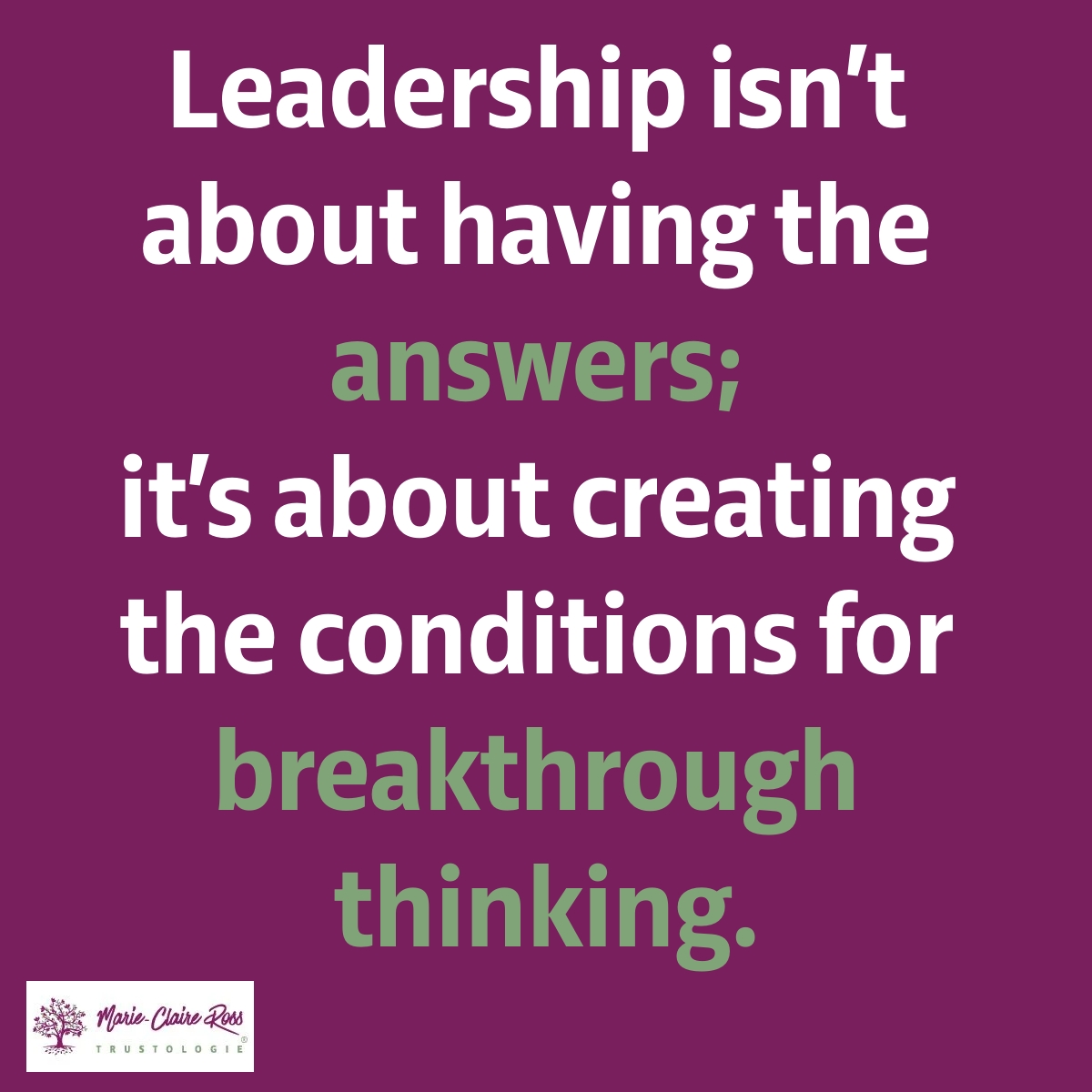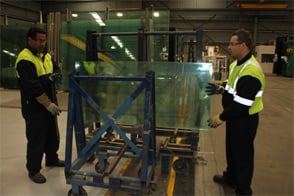7 min read
Navigating Difficult Conversations: 7 Steps for Emotionally Intelligent Leaders
Navigating difficult conversations at work isn’t just a “nice to have” leadership skill – it’s the fault line that often separates healthy,...
Develop leaders, strengthen executive teams and gain deep insights with assessments designed to accelerate trust and performance.

Transform how your leaders think and perform with keynotes that spark connection, trust and high-performance cultures.

Explore practical tools, thought-leadership and resources to help you build trusted, high-performing teams.

Trustologie® is a leadership development consultancy founded by Marie-Claire Ross, specialising in helping executives and managers build high-trust, high-performing teams.

7 min read
Marie-Claire Ross : Updated on January 9, 2025

Have you ever heard about the surprisingly positive influence teachers have on students when they hold high expectations for their academic abilities?
Known as the Pygmalion Effect, educational research shows that students can change as a result of how their teachers see them. Teachers who have high expectations of their students create students who believe in themselves and who excel at school. Likewise, when teachers have low expectations of their students they under-perform.
In my wisdom, I decided to have high expectations of my oldest daughter. At primary school, she did well in all her subjects. She understood mathematical concepts with ease, learnt to read quickly and excelled at spelling and grammar. My expectations were high because I could see by her grades that she was doing well. I put her into scholarships and assumed I didn't need to do much to guide her on her learning.
With my youngest son, however, things were very different. He struggled with reading, understanding Maths and learning basic concepts. I spent a lot of time with him helping him learn to read (thank goodness for Reading Eggs, a reading software that helped us both). By age 9, he was diagnosed with ADHD and suffered some fairly hideous bullying at school. His grades dropped further and my expectations for him also fell. It seemed wrong to have high expectations on a kid who was clearly struggling with anxiety and showed little interest in learning.
But it's funny how things change.
As it turned out my oldest child struggled in secondary school. My choice of an alternative school that believed in every child, meant they were always telling me how wonderful she was but omitted to tell me where she was flunking. My high expectations of her and the comparison to her youngest sibling meant that I falsely believed she was an academic student and would do well. So I failed to see the warning signs all was not well.
In Year 9, she tearfully said to me "Mum, I am not as smart as you think I am." My automatic reaction was to tell her that wasn't true and that she just lacked confidence in her abilities. All she needed to do was to apply herself more to her studies. It wasn't until a year later that I realised with absolute shock, when I sat with her to do a science report, just how little she knew about not only basic scientific concepts, but how to even write a science report.
The high expectations I had set for her (and which were compounded by a school that always said positive things) meant that I had totally missed that something was deeply wrong. My assumptions about her ability to learn effortlessly were outdated and unfair. The truth was my daughter was unable to write. In primary school, she had written stories with ease. But by secondary school, she struggled to write a sentence in response to a question. She could never finish an exam. Even worse, was she didn't seem to understand anything her teachers told her.
When I realised the extent of her learning gaps, she yelled at me "Your expectations of me are too high. I am not that smart. I need you to lower your expectations." I was totally oblivious that the high expectations I had imposed were causing her so much anxiety. She had been hiding her struggles at school for fear of displeasing me.
So I lowered my expectations. The dreams I had of her going to University were replaced with her going to TAFE. The belief I had that she could do the International Baccalaureate were replaced with her doing VCAL. But I knew something else was amiss and it was another year before she was diagnosed with autism.
Today, she has the learning support to help her and we saw a massive improvement in a year thanks to a better school. She even managed to finish Year 12 which was quite an achievement. I've readjusted my expectations in alignment with what she can accomplish. Now, for her being able to fill out an online form is a positive step in the right direction. While finishing homework on time is now a reasonable expectation for her TAFE course. Thankfully, she has an occupational therapist, a psychologist and a speech therapist to help her.
In the meantime, her younger sibling has managed to close some significant learning gaps. Online school seemed to help them focus better and become more determined to do well. Even when he couldn't be physically present for school classes due to crippling social anxiety, he still managed to teach himself and work with their teachers online. He also brutally called me out on my low expectations, telling me assertively, "Mum, you've got to stop having low expectations of me. I want to go to Uni and I want to get the best score I can. I want you to think higher of me." Their commitment and dedication to their education amazes me (including opting to do summer school in their holidays).
You can understand why I have done a lot of re-thinking about expectations. Life also tends to mirror what we need to learn and I coach a lot of leaders who struggle because they have either set ambitious expectations with their team right through to those who fail to set clear standards of performance.
This is what I have learnt.
As human beings we thrive when we are supported to learn and grow. In business, high expectations need to be a tool in a leader's playbook to communicate what high-quality work looks like. It's even better when we compare high performance standards with low performance standards. Or differentiate the difference between good workplace behaviours and poor.
This provides clear boundaries on quality standards and behaviour expectations. It can also be motivational giving people a clear roadmap on what to work towards. Without them, substandard work becomes the norm. They are a driver of change and continual improvement.
Where I got it wrong with my eldest daughter was that I had decided that she was like me, but smarter. My bias towards valuing intelligence and academic prowess meant that I had placed an expectation on my child that was more about me than her. I put her in a box that she became trapped in.
This is also a common pitfall with business leaders. Setting an expectation of who we think someone is and holding them to that standard can be flawed, if we are biased.
With some of my coaching clients, who are new to leading others, they often get frustrated with how long someone takes to learn a task that they used to do with ease. They expect their ability to learn or do a task correctly will be the same for everyone. And they therefore judge everyone accordingly.
The risk here is two-fold.
The first is that high expectations based on personal bias means that you hold people to unreasonable standards. If anything, it's a form of controlling perfectionism which makes others feel inadequate. They second guess themselves, lose confidence and stop trying. They find it hard to discriminate between unfair or perfectionist standards and where they fall short, so it becomes easier for your employees to do nothing.
The second is that if you see that your high expectations aren't being met, the brain short-circuits to judgment and reaction. In these circumstances, you can alienate your team and create a lack of psychological safety that works against performance being improved.
Where high expectations can go wrong is if we have a set and forget type of approach. That was the mistake I made with my daughter. I just assumed she would do well, based on her previous track record of primary school. Of course, secondary school is very different. I now realise that a lot of autistic kids do well in the early years of schooling, but struggle once learning becomes more self-directed.
In a workplace, you need to consider the assignment you are delegating to others. It's beneficial to ask yourself: Are my expectations reasonable? Do I have any personal biases influencing my expectations?
If the project is one that requires new skills and capabilities, then you need to provide more guidance and mentoring. It also means checking in to make sure people have adequate resources to do the job and assessing that the timeline is appropriate.
When we are frustrated with someone's performance, it gives us an important opportunity to look within ourselves, not only for our triggers, but on how to improve our approach.
As a society, we are all starting to learn that we can't treat everyone the same. A one-size-fits-all approach rarely works.
A question that is important to consider comes from a powerful Harvard Business Review article on leadership frustrations. And that is: What do I know to be true about this employee?
Taking a step back and assessing the whole person becomes important, so that we don't jump into blame and negative reaction. It's about understanding their communication, learning and work preferences. It's knowing their skill level and providing support where there are gaps.
It's about checking in with each individual to work with them the way they prefer - the amount of autonomy, support, communication, check ins and connection. And it's about compassionately inquiring when their performance starts to deteriorate.
This is even more important for neurodiverse workers who work and learn differently.
As I reflect on my failure to mould my expectations around the unique needs and styles of my kids, I also admit that my expectations for myself have also been out of whack. One thing I have learnt is that sometimes having more general expectations are easier to achieve than really specific ones.
As my oldest daughter wrote on her school yearbook "Lower your expectations and work towards your dreams."
It's amazing what we can achieve if we give ourselves the slack to achieve something differently than we first envisaged. It gives us the space to allow the universe to surprise us and open doors that might have been closed because of our tightly held expectations of what was possible. It reduces frustration and self-directed anger when things don't turn out the way we want.
This sounds pretty obvious, but what I find with many leaders I coach is that they have failed to spend the time getting clear on what success looks like and checking for understanding.
The result is that expectations aren't met because people are confused.
Taking the time to plan what you need to communicate is critical before you go off and delegate work. Then, getting people to repeat back what you want so you can ensure they properly understood you.
An important part of upholding high standards of performance is to measure key performance metrics.
Work with your employee to determine what are the most appropriate measurable performance standards.
Setting standards that are hard to control or attain generates strong resistance and creates a lot of frustration with teams.
By working with employees to find out how to create measurable performance standards that are fair, we create a more transparent working environment.
High expectations are a great tool to motivate higher performance in our people. While they are critical in setting the quality standards of deliverables, we need to ensure flexibility in how they are achieved.
This means realising that not everybody is the same. More importantly, not everybody is like us. What has worked to help us personally achieve high standards, might not work for some of the people on our team. They might need more time, more coaching or more training.
Having a flexible approach in how our expectations are achieved means that we are less likely to get frustrated with our team and jump into blame. The result is that our people will be more likely to let us know when they are struggling to perform, giving us the ability to properly guide them on their path. It will also improve psychological safety and reduce strong resistance to our leadership.
And what I have learnt is that giving people the bandwidth and opportunity to be themselves is the biggest gift of all.

7 min read
Navigating difficult conversations at work isn’t just a “nice to have” leadership skill – it’s the fault line that often separates healthy,...

8 min read
When my daughter was 17 months old, she discovered a superpower: the word “Why?”For the next two years, it was her response to almost everything.

11 min read
I have a friend who often finds herself at the mercy of her emotions. Recently, she called me to rehash a confrontation she’d had with a group of...

Another high-pressure management meeting has just closed with no clear actions. Targets missed. Heightened tension about employee bonuses still not...

Research has found that the majority of workers have seen their workmates engage in risky safety behaviour.

We've all heard the term "Death by PowerPoint" and the majority of us have been scarred by poor presentations and classroom learning techniques, at...